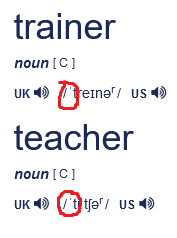Stressing syllables correctly for clearer communication (A2-B1)
Do you buy someone a /ˈprezənt/ or a /prɪˈzent/?
Incorrect word stress can cause communication problems. But what is word stress and are there any rules we can learn to help us to stress syllables correctly?
My name, Darren, has two syllables: da.rren.
A syllable is a beat in a word, which we can show by clapping our hands.
da.ren
train.er
teach.er
Darren, trainer and teacher have two syllables.
However, some words only have one, like my last name, Wade, and the word man.
When a word has two or more syllables, one syllable is a little louder.
Is the first or the second syllable a little louder in these words?
da.ren
train.er
teach.er
The first syllable is louder. The loudest syllable in a word is called the stressed syllable. The way that a word is stressed, for example on the first or second syllable, is called word stress.
Is word stress really so important?
To buy someone a /ˈprezənt/ is correct. The stress is on the first syllable - present.
You might /prɪˈzent/ a report to your colleagues at a meeting. Here the stress is on the second syllable - present, and there are also some differences in the sounds.
When people think about language mistakes, they usually think of grammar errors. But incorrect word stress can make communication very difficult.
If you told your colleagues that you were going out at lunchtime to get a /prɪˈzent/, they might ask you to explain what you meant.
How do I know where the stress is?
It's best to check in a dictionary if you're unsure.
The two examples below are from The Cambridge Learner's Dictionary website and I've added two red circles around a special character which looks like this: '

It's called a stress marker and the stress marker comes before the stressed syllable.
In the words trainer /ˈtreɪnər/ and teacher /ˈtiːtʃər/, the first syllable is stressed.
However, in the words ago /əˈɡəʊ/ and about /əˈbaʊt/, the second syllable is stressed.
A very helpful rule - the schwa
The sound /ə/ at the beginning of the words ago /əˈɡəʊ/ and about /əˈbaʊt/ is called the schwa. It's never stressed. Therefore, when you have a two-syllable word and one of them is the schwa, it's always the other syllable that is stressed.
Also, when you have -er at the end of a word, like trainer and teacher, the -er is mainly pronounced /ə/ so it isn't stressed.
Some tips for remembering word stress
- When you learn a new word, write it in a vocabulary book and underline the stressed part of the word.
- Or, you can use a system of small circles and one larger circle to help you with syllables and word stress. For example, this method can be used to show that the word receptionist has 4 syllables and that the second syllable is stressed:

Another helpful rule - suffixes
Look at the examples below.
Is the same syllable stressed when we add the suffixes below?
 |
 |
| inform | information |
 |
 |
| electric | electrician |
 |
 |
| responsible | responsibility |
No, it isn't. The word stress changes when we add the suffixes -tion, -ian and -ity. For example, the second syllable is stressed in inform, but the stress falls on the third syllable in information.
Are suffixes stressed?
No, suffixes are never stressed in English.
With the suffixes -tion, -ian and -ity, the stress usually falls on the syllable BEFORE the suffix: information; electrician and responsibility.
Interested in learning more?
Look at another group of suffixes below. What happens to the word stress when we add these suffixes? Does the stressed syllable change or does it stay the same?
neighbour /ˈneɪbər/ - neighbourhood /ˈneɪbəhʊd/
relation /rɪˈleɪʃən/ - relationship /rɪˈleɪʃənʃɪp/
free /friː/ - freedom /ˈfriːdəm/
happy /ˈhæpi/- happiness /ˈhæpinəs/